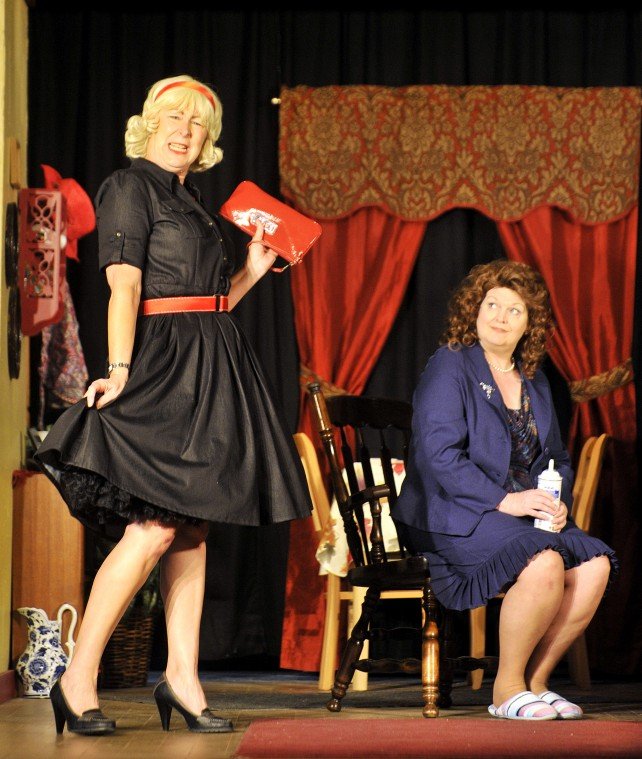
There are laughs to be found on a small side street in the heart of Gilroy, where the Pintello Comedy Theater has brought mirth and merriment to Gilroy for 10 years and counting. Crowded on either side by industrial development, the Grange Hall – as the interwar period building located at 8191 Swanston Lane is formally known – sits back about 50 feet from the street in the shade of a giant Himalayan Cedar tree.
While the cream-colored, wooden edifice channels a bygone era, its stage comes alive each year with vibrant personas from restoration to slapstick, farce to commedia dell’arte.
Theater is a family affair for theater founders Rod, 67; and Marion Pintello, 64; their daughter Whitney Pintello, 44; son Simon Pintello 40; son-in-law Charlie Gilmore, 43; and granddaughters Shelby, 15; and Mary McClelland, 13.
The Pintello’s theatrical odyssey is enriched by approximately 88 members of the community who have starred in classic and contemporary productions since the curtain was raised on the outfit a decade ago.
“This is their hobby like it’s our hobby,” said Whitney.
Ideals of community and family are steeped in the history of the building and the Pintello family. That feeling is palpable in the hall’s atmosphere, where pictures of previous productions adorn the walls. The energy captured in those cast photos seem to leap off the print into the present.
On the closing night of A.R. Gurney’s “Sylvia,” the company’s last show that ended March 2, the 100-seat theater was packed with its largest audience since opening.
But for Rod, it boiled down to much more than ticket sales.
“We knew almost every person in that room,” he recalled with a smile as he leaned back in his chair and surveyed the room.
Knowing all of the patrons by sight and by name intensifies the bond the theater is proud to have established with Gilroy, he explained.
“It’s like having 100 people over to our house,” he beamed, echoing American playwright Robert Brustein’s observation that, “theatergoing is a communal act, moviegoing is a solitary one.”
The convivial atmosphere spreads like wildfire on performance nights, Whitney added.
Part of the draw, she thinks, is the fact that patrons recognize performers in the plays from the world outside the theater doors.
“They see real local folks here,” said Whitney, whose bright eyes and animated personality shine on and off the stage.
Getting box numbers within striking distance of three digits on a regular basis didn’t happen in a New York minute, however.
It took a solid 20-year background of participating in community theater – not beginner’s luck – before the Pintellos made the big leap into owning and running an independent theater.
And, contrary to the age-old stereotype, the actors in this limelight-loving family are anything but starving.
“We’re doing really good theater,” said Marion, proudly.
Past productions that have brought the house down include Bill Russell and Frank Kelly’s “Pageant,” and Neil Simon’s “Rumors.”
Pintello’s playhouse prowess has even attracted the attention of North Carolina-based Jones Hope Wooten, a trio of U.S. playwrights specializing in comedies with a distinctly Southern flavor.
The triad of wordsmiths include Jessie Jones, Nicholas Hope and Jamie Wooten, who are currently writing a play that Pintello will produce and perform for the first time anywhere in the world. The as-yet unnamed project is tentatively scheduled to debut in April or May of next year.
“We are very, very excited about it,” enthused Marion, who playfully declined to reveal any plot details.
“We don’t even know the title yet, but we agreed to it,” laughed Whitney.
The Pintello legacy
A hunger to enlighten the masses with quality, hearty comedy shines through the Pintello’s recounting of how their operation blossomed into the laugh-packing powerhouse it is today.
In 2003, The Pintello Comedy Theater was originally situated in an old Kingdom Hall on Church Street. The family decided two years later to take the show on the road, which involved loading all their props and sets into a U-Haul and touring local restaurants and country clubs in South County. It was during this nomadic phase the Pintellos performed at Morgan Hill’s Grange Hall. The family liked the look and feel of this building, which led them to inquire about and ultimately lease the sister hall in Gilroy, which is also owned by the same national agrarian advocacy group.
It has been the group’s home ever since.
“It’s an opportunity to perform. You don’t get too many out there,” explained Rod, referring to how the theater caters to Gilroyans looking for an artistic outlet.
The theater’s relationship with the community doesn’t stop there, added Whitney. Patrons provide direct input on the types of plays they’d like to see onstage, often talking to the Pintellos directly after a performance to offer feedback.
“They have their favorites,” she laughed.
In the past, some shows have been scrubbed from the list of possible productions by the Pintello family simply because Gilroyans are quite specific about the way their plays should end, noted Whitney. Shows such as Norm Foster’s “Drinking Alone,” explained Whitney, didn’t make it past the selection process because they end on a more sober note.
That’s not to say poignant pieces don’t get onto the stage, she added, but there can’t be too many tears when you’re running a comedy theater.
“They just don’t want them all the same,” she explained, referring to the style changeup returning theatergoers have come to expect.
“We’re very conscientious about which type of show we do and when,” added Rod.
Whatever the Pintello Comedy Theater is doing, it’s doing it right, said Simon.
He notes that while other theater groups commonly offer a rotating mixture of genres throughout the course of a season such as musicals, dramas and productions for younger audiences, variety isn’t necessarily the spice of life – or success strategy – at Pintello. They’ve gotten along just fine sticking to their comedy guns.
“We only do comedies,” said Simon, affirming the Pintello’s logo that greets theatergoers the moment they walk into the lobby, which – unlike the traditional duo of smiling “Thalia” and frowning “Melpomene” masks (representing the muses of comedy and tragedy in ancient Greece) has a pair of grinning masks.
The preparation for each show requires passion and dedication, explained Rod. Cast members are expected to attend two weekly rehearsals in the six to eight weeks leading up to opening night. More rehearsals get tacked on as the debut date nears, bumping the final total to somewhere around 22.
The upshot of the cast’s hard work is nine performances over the course of four weekend evenings and a single afternoon matinee.
The balancing act
A causal observer could look at all the work the Pintellos pour into a show’s production – every family member has a hand in at least one vital aspect of the show – and assume the clan has very little time for anything else. The Pintellos, all of whom have full-time jobs, meet this notion with peals of laughter and hoots of derision.
“We’re wildly busy all the time,” said Marion.
Rod and Simon work at Hazel Hawkins Memorial Hospital in Hollister; Whitney is a part-time wedding officiate and full-time artist whose work won the 2012 Gilroy Garlic Festival annual Art Poster Contest; and husband Charlie is a manufacturing engineer for Gosiger, a machine tools sales company headquartered in Dayton, Ohio.
And while Marion is on the verge of retirement from Kaiser Permanente in San Jose, she plans on staying busy between the theater and the home-operated, American Express travel agency she and her husband recently purchased.
“Nobody needs to sleep,” joked Rod.
The next show in the pipeline, for which rehearsals are currently underway, is Ken Ludwig’s “The Fox on the Fairway,” which will run from April 26 to May 18. The theater is also putting on a limited run of Billy Van Zandt and Jane Milmore’s “You’ve Got Hate Mail” March 29 and 30 at the Westside Grill at 8080 Santa Teresa Blvd., Suite 100 in Gilroy.
The latter production is a slightly risqué show, the idea for which came up after the Pintellos put on a similar play on New Year’s Eve last year. The audience ate it up.
“It was a smash hit and tested an R-rated show, something naughtier than we usually do,” laughed Whitney. It was such a huge success that the Pintello family decided to do a short run of it, she explained.
As the Pintello Comedy Theater continues doing what it does best, the family’s patriarch, Rod, underscores the most important act of all: one that balances family values, a love for the stage and a commitment to excellence.
“We look forward to everybody’s input on everything. We have got great ideas from each other,” he said, surveying the family members who sat around him in the theater’s velvet-covered chairs. “We can share this with each other.”
Grange Hall has a history all of its own. The property is owned outright by the Grange, an American agricultural advocacy group founded after the Civil War in 1867, and is leased to the Pintello Comedy Theater.
Because of the Grange Hall’s agricultural pedigree, local groups including beekeepers, 4-H, Boy Scouts and Master Gardeners also have access to the building.
However, many of these groups never use the main hall area. Enter stage left: The Pintello Comedy Theater. Their shows fill up the place, keep it maintained and bring people to an area of Gilroy they probably never knew existed.
“It’s really been a symbiotic relationship between us and The Grange now for seven years,” remarked Marion Pintello.
The Grange Hall was originally a Japanese School built in 1928 on land donated by local seed company owner Lin W. Wheeler, said local historian and author Elizabeth Barratt.
Designed and built by Prof. Yozo Odashima, the school served as the cultural cornerstone for the local Japanese population for 14 years. There were plans to add an auditorium to the school in September, 1941, added Barratt, but the Dec. 7, 1941 Japanese attack on Pearl Harbor put an end to all plans for expansion.
As the specter of war turned into reality in 1942, approximately 464 Gilroy-area Japanese and Japanese Americans were interned in camps across the U.S., said Barratt.
As trucks, trains and buses loaded with people being forcibly relocated from their homes on the West Coast gathered steam, Gilroy’s Japanese cultural and language learning center was closed down.
In 1944 Mr. Wheeler and his wife were killed in a automobile accident and the Grange bought the property from his estate. The building was formally dedicated in its new capacity as a Grange Hall on May, 29, 1945, said Barratt.
The building is eligible to be included on the National Register of Historic Places, according to President Connie Rodgers of the Gilroy Historical Society. The building is already included on the list of Gilroy’s Historic Sites.













